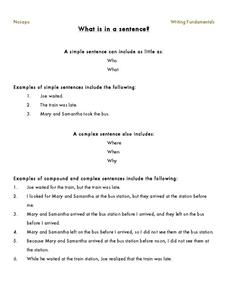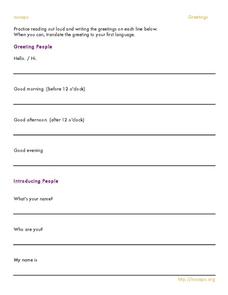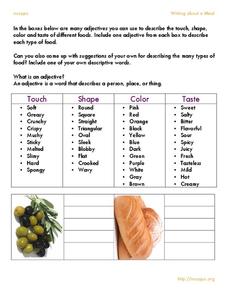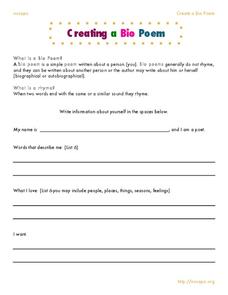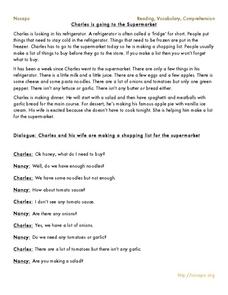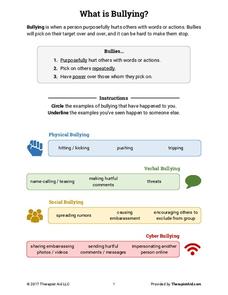Cornell University
Celebrate Urban Birds
Set up a 50x50 square foot area in a space at school and choose three days to go outside and observe the birds seen in a 10 minute span. The activity has learners tapping into their observation skills and creates awareness of the birds...
Nosapo
New Year’s Resolution
Begin the new year with a two-part activity that asks class members to formulate a resolution and to write about someone or something they are proud of. These statements are then attached to a snowflake and a mandala which they decorate.
Nosapo
What Is in a Sentence, Paragraph, and Story?
Language arts is made up of many parts. Learners review the parts of a sentence, as well as how to make a simple sentence into a complex sentence, before examining full paragraphs and identifying the topic, body, and concluding sentence...
Rensselaer Polytechnic Institute
Molecules to the Max!—Teacher's Discovery Guide
Molecules to the Max! refers to a movie released in 2009 about the world of atoms and molecules. A helpful discovery guide provides five posters on science topics typically covered at the middle school level. It also explains the...
National Association of School Nurses
Learn to Be Smart and Safe with Medicine
Begin educating young people on how to be smart and safe with medicine. Use a set of workbook pages to explore what symptoms are, uses for medications, how to read prescription and over-the-counter medicine labels, and who to trust when...
Nosapo
Writing Prompt: Write About a Photo
Practice descriptive writing with a prompt that includes a photograph. Writers craft the whole story of the single second caught in a photo using the provided questions to prompt their imaginations.
Nosapo
Greetings
Hi! How are you? Join the conversation with a straightforward exercise on English greetings. After translating common greetings into their first languages, class members practice greeting each other and note the appropriate responses.
Nosapo
Family Titles, Pronouns, Writing about a Person
How is your grandmother related to you? How is your cousin related to your grandmother? Learn about family relationships and pronouns with an activity that guides pupils to write two short narratives about members of their families.
Nosapo
Writing about a Meal
You don't need to be a food critic to describe your meal accurately! A series of activities introduce learners to vivid adjectives when writing about the taste, smell, and feel of food. After working with word choice, parts of a...
Nosapo
Creating a Bio Poem
Find out what's special about your pupils with a fun biopoem activity! As they fill out their name, words that describe them, what they love, and what they dream of, learners create an expressive poem about themselves.
Nosapo
Reading, Vocabulary, Comprehension
Whether you teach mainstream elementary classes or older English learners, a set of reading comprehension resources is a great addition to your language arts curriculum. Ten activities each include a reading passage and set of...
Nosapo
Pronouns: Personal Pronouns, Demonstrative Pronouns
Which do you use: that or this? Which or where? Me or I? Practice pronoun use with a series of activities that focus on personal and demonstrative pronouns.
Nosapo
Reading Activity: Circle the Right
Fables can teach us about life's morals, but they are also helpful for reviewing verb tense, spelling, and word choice. Three reading passages feature well-known fables, each with several opportunities for learners to circle the correct...
American Physiological Society
What Environmental Conditions Lead to the Hatching of Brine Shrimp?
Will changing the environment in which brine shrimp live impact their reproductive success? Young scientists get hands-on experience studying the habitat of brine shrimp in a two-week immersion lesson. The teacher's guide provides all of...
Curriculum Corner
Root Words
Ten pages offer useful information and five activities designed to reinforce the concept of root words. Scholars make a root word booklet, partake in a matching activity that challenges them to match root words to their meaning, record...
Possibilities
Disability Awareness Activity Packet
Bring awareness to disabilities with a packet consisting of a variety of activities designed to inform scholars about disabilities—autism, hearing impairments, physical disabilities, and more! Learners test their communication skills,...
Cornell University
Field Day: Be an IPM Detective
Become a pest detective! Individually or in small groups, scholars scout the land to discover which pests—plant and animal—inhabit it, determine whether the pests are endangering the environment, and summarize their findings.
Cornell University
Weed IPM
Go on a weed hunt! Scholars gain insight into the characteristics of plants and examine the outdoor environment in order to identify five different types of weeds. Learners then show what they know with a one-page reflection.
Cornell University
Insect IPM
Find out the characteristics that makes a bug an insect with a workbook designed to inform scholars about the crawly creatures that live around us. Scholars complete an ant-themed word search, answer questions using a solution key, and...
Cornell University
What is IPM?
Discover what a pest is and how to identify one with a lesson that looks closely at our outside world and taxonomy. Scholars investigate insects and plants to practice their identification skills, take a survey, and explore the...
Therapist Aid
What is Bullying?
What is the definition of bullying, and how can you deal with it? Elementary and middle schoolers discuss verbal, physical, social, and cyberbullying before talking about strategies to avoid and stop bullying in their school.
National External Diploma Program Council
Measuring in Metrics
Practice measuring skills with a 10-question worksheet that challenges scholars to measure lines using centimeters and inches.
North Shower Community College
Preparing for Tests, Taking Tests, Reducing Test Anxiety
As testing season is upon us, give class members a way to prepare their minds and bodies for the big day. A resource promotes deep breathing exercises and comfortability to reduce anxiety. Along with multiple choice, short answer, and...
National External Diploma Program Council
Measuring in Inches
Measure lines in inches using the most common tool of measurement: a ruler. Young mathematicians use a ruler to measure various lines. They also learn to round the the nearest quarter when measurements are not precise.




